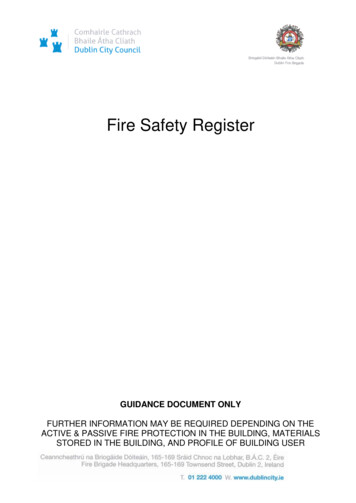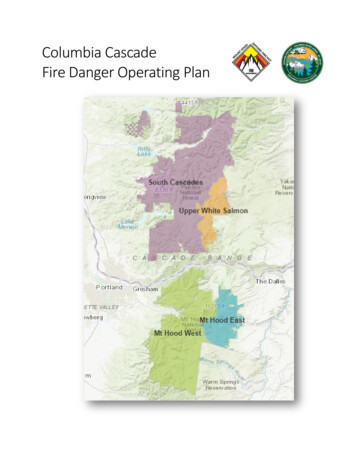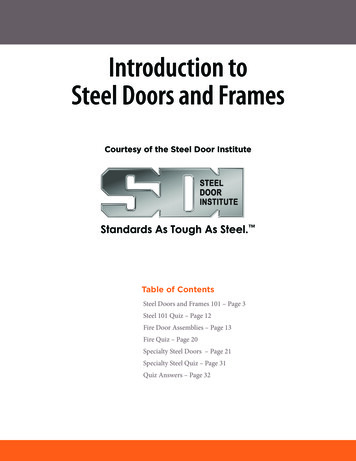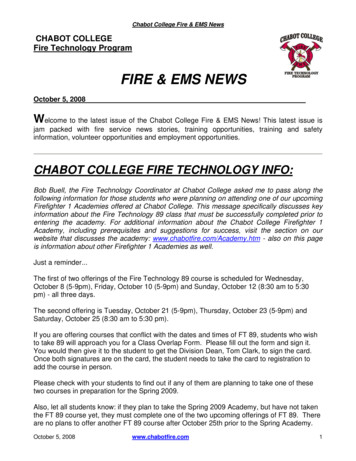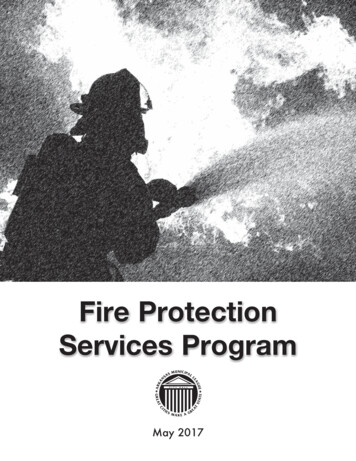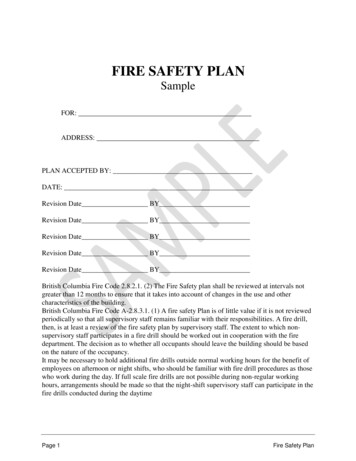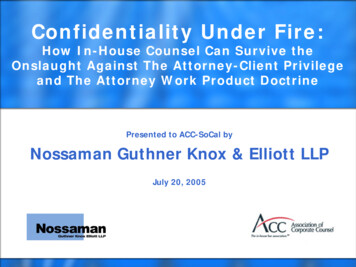
Transcription
Confidentiality Under Fire:How In-House Counsel Can Survive theOnslaught Against The Attorney-Client Privilegeand The Attorney Work Product DoctrinePresented to ACC-SoCal byNossaman Guthner Knox & Elliott LLPJuly 20, 2005
Introduction – Scope of Presentation What communications are protected by the attorneyclient privilege? What is the attorney work product doctrine, and howdoes it differ from the attorney-client privilege? What are some of the “hot topics” in these areas? How do these rules apply in the context of a criminalinvestigation? Under what circumstances might a company want towaive the attorney-client privilege?2
Attorney-Client PrivilegeGenerally A client – whether or not a party – has a privilege to refuseto disclose, and to prevent another from disclosing, aCONFIDENTIAL COMMUNICATION between the CLIENTand his/her LAWYER. (Evid. Code, § 954.) The privilege commences upon a client’s first consultationand lasts as long as the holder is in existence.(Evid. Code, § 954.) As long as there is a holder in existence on behalf of adefunct entity client (corporation, partnership, LLC), theprivilege survives the dissolution of the entity. (Evid.Code, § 953(d).)3
Attorney-Client PrivilegeFederal Law In federal question cases, privileges are determinedunder federal common law. The Ninth Circuit describesthe attorney-client privilege as follows:“When legal advice of any kind is sought from aprofessional legal advisor in his capacity as such, thecommunications relating to that purpose, made inconfidence by the client, are at the client’s instance,permanently protected from disclosure by the client orby the legal advisor, unless the protection be waived.”4
Who Counts As a “Lawyer”? “Lawyer” includes both a business entity’s in-house andoutside counsel. “Lawyer” includes counsel for an entity’s wholly-ownedsubsidiary. BUT: In-house counsel not acting in a lawyer capacityare not subject to the privilege.5
What Counts As a “Communication”? Communications between a corporation’s employees andits attorneys are privileged to the extent suchcommunications are within the scope of the employee’sresponsibility or the employee is a co-party with thecorporation. Communications between corporate counsel and acorporate employee may be privileged if the employee(even if not a co-party to litigation) is the “natural person”to speak for the corporation on the subject of thecommunication.6
Statements By Witnesses May Not BePrivileged “Communications” In general, communications to a corporate lawyer by anemployee who is simply a witness to some occurrence donot constitute protected communications. However, if the employee’s connection with the matterarises out of the fact that his/her statement or report isrequired “in the ordinary course of business,” thestatement is that of the corporation and may be protected. Such statements/reports are protected if their dominantpurpose is for confidential transmittal to the corporation’scounsel.7
Deciding Whether a StatementQualifies For The Privilege Example 1: P sued D for personal injuries because of a fall on asidewalk. Corporate employee had performed work on thesidewalk and had given a statement about the incident to acorporate agent hired by the employer’ insurer to investigate.The statements were not protected. Example 2: Hospital directed staff to report all incidents whichmight result in lawsuits to counsel on a form entitled“Confidential Report of Incident” Nursing director reportedincident to administrator who reported to insurance carrier whoreported to attorney. The report was protected.8
Who May Assert The Privilege? Corporate officers may assert the privilege on behalf ofthe corporation. Corporation may assert privilege against its ownshareholders. This is true even in a shareholdersderivative action.9
The “Crime Fraud” Exception(California Law) There is no attorney-client privilege if the attorney’sservices were sought or obtained “to enable or aidanyone” in the commission of a crime or fraud. This exception applies only where the client seeks legalassistance to plan or perpetrate a crime or fraud. Consummation of a crime or fraud is not required; anattempt is sufficient.10
The “Crime Fraud” Exception(Federal Law) The attorney-client privilege does not apply tocommunications “in furtherance of intended or presentcontinuing illegality.” Federal courts will apply a two-pronged test fordetermining whether the crime fraud exception applies.11
The “Crime Fraud” Exception(Two-Pronged Test) There must be a showing that the client was engaged inor planning criminal or fraudulent conduct when he/shesought the advice of counsel or that the client committeda crime or fraud subsequent to receiving counsel’sadvice. There must be a showing that the attorney’s assistancewas obtained in furtherance of the criminal or fraudulentactivity or was closely related to it.12
The Work Product Doctrine in California(Code Civ. Proc., § 2018) Any writing that reflects an attorney’s impressions, conclusions,opinions or legal research or theories is absolutely protected. All other work-product is conditionally protected (i.e., protectedunless the court determines that denial of discovery will unfairlyprejudice the party seeking discovery in preparing a claim ordefense). Work-product includes that of an attorney’s employees, agents,investigators, researchers, etc. The California work product doctrine applies to litigation ANDnon-litigation matters.13
The Work Product Doctrine Under Federal Law(Fed. Rules Civ. Proc., rule 26(b)(3)) Most work-product is only conditionally protected and may beproduced upon a showing of good cause. Even opinion work-product may be discovered and admitted“when the mental impressions are at issue in a case and theneed for the material is compelling.” It includes materials prepared by the party or by anyrepresentative of the party, including a consultant, surety,indemnitor, insurer or agent. The federal rule protects trial preparation material that revealsan attorney’s strategy (i.e., it does not extend to non-litigationwork product).14
Discussion of “Hot Topics” Ex Parte communications by opposing counsel. Internal employment investigations. Sarbanes-Oxley Act, 15 U.S.C. § 7245 (“SOX”). Criminal prosecution and targeting ofcorporations/effect on attorney client privilege. “Voluntary” waiver of the privilege in the face ofgovernment investigation.15
Communications With Corporate Directors,Officers, Employees And Former PersonnelCalifornia Rules of Professional Conduct, rule 2-100 It is unethical for counsel to communicate with an officer,director or managing agent of an opposing corporation that isrepresented by counsel. It is unethical for counsel to communicate with an employee ofan opposing corporation if the communication concernssomething which may be binding upon the corporation. Violation of rule 2-100 exposes counsel and his/her entire firmto possible disqualification.16
Communications With Corporate Directors,Officers, Employees And Former PersonnelCalifornia Rules of Professional Conduct, rule 2-100 However, it is not a violation or ground for disqualification forcounsel to interview an opposing party’s former officer, directoror employee (who are not themselves represented by counsel)without opposing corporation’s counsel’s knowledge or consent. Such interviews may not make inquiries into privileged matters. If a corporation is concerned that a former officer, director oremployee may disclose privileged information, it is incumbentupon the corporation to seek a protective order.17
Internal Employment Investigations Issues concerning internal employment investigations arecommon in cases involving harassment claims. The adequacy of an internal employment investigationmay be a defense to damages on a harassment claimbased upon the “avoidable consequences” doctrine.18
The “Avoidable Consequences” DoctrineUnder the “avoidable consequences” doctrine, the employermay reduce the amount of damages awardable on aharassment claim if the employer proves:1. That it took reasonable steps to prevent and correct workplaceharassment;2. That the employee unreasonably failed to use the preventive andcorrective measures; and3. That a reasonable use of the employer’s procedures would haveprevented at least some of the harm the employee suffered.19
Privilege Issues ConcerningInternal Investigations Where a corporation seeks to assert the avoidable consequencesdoctrine, plaintiff will likely seek production of the documentsgenerated in the investigation. Courts will look carefully at claims that the documents generatedin the investigation are privileged. Courts may rule that assertion of the “avoidable consequences”doctrine places the privileged material at issue, resulting in awaiver of the privilege. Even in this context, courts may uphold the privilege as to anattorney’s analysis concerning the adequacy of the investigation(as opposed to the documents generated in the investigationitself).20
Sarbanes-Oxley Act(“Reporting Up”) “Reporting Up”: Attorneys for PUBLIC companies whoappear and practice before the Securities and ExchangeCommission must report evidence of material violations ofthe securities laws or other breaches of fiduciary duties tothe corporation’s chief legal counsel or chief executiveofficer. If the chief legal counsel or CEO does not respondappropriately, the attorneys must report the evidence tothe corporation’s audit board or other appropriatecommittee of the company’s board of directors.21
“Qualified Legal Compliance Committee” A company may establish a committee of outsidedirectors, known as a “Qualified Legal ComplianceCommittee.” (QLCC), to which SOX reports may be made(in lieu of reports made to the chief legal counsel or CEO). A lawyer who makes a report to a QLCC need notdetermine the appropriateness of the response and isrelieved of taking further action.22
Sarbanes-Oxley Act(“Reporting Out”) “Reporting Out”: an attorney appearing before the SEC“may” (under certain circumstances) reveal to theCommission, without the issuer’s consent, confidentialinformation related to the representation to the extentnecessary:¾to prevent the issuer from making a material violation;¾to prevent the issuer from committing perjury; or¾to rectify the consequences of a material violation.23
Sarbanes-Oxley Act(“Reporting Out”) The California State Bar committees contend thepermissive “reporting out” provisions conflict with stateethics rules that preclude such disclosure. The SEC asserts that that the regulations preempt statelaw. If the regulations are held not to preempt state law, aCalifornia lawyer who follows the permissive “reportingout” rule may be subject to State Bar discipline and/orbreach of fidiciary duty claims.24
Proposed “Reporting Out” Rules The SEC has proposed two alternative “reporting out” rulesto address what actions must (or may) be taken if anattorney who has reported evidence of a material violationunder the “reporting up” rules does not receive a response. The SEC has not made a final decision on these proposals;it is monitoring the impact of the "reporting up"regulations. There is no definite time frame in place for the SEC tomake a decision as to whether to move forward with eitherproposed "reporting out" rule.25
The Proposed Rules Generally Under the first proposed “reporting out” rule, where an attorney has not received anappropriate response to a report, believes a material violation is ongoing or isabout to occur, and believes that the material violation is likely to result insubstantial injury, then the attorney must take specified actions, potentiallyincluding withdrawal from the representation, coupled with notification to the SEC ofthe withdrawal. Where the attorney has withdrawn, the issuer’s chief legal officer must inform anynew attorney that the previous attorney withdrew for professional considerations. Under the first proposed ‘reporting out’ rule, if the lawyer believes the conduct isnot ‘on-going,’ the lawyer ‘may’ report to the SEC but is not obligated to do so. The first proposed rule states that giving any notice as described will not breach theattorney-client privilege. Under the second or alternative ‘reporting out’ rule the standard for the lawyer isallegedly higher. Rather than ‘believing’ that a material violation is likely, theattorney must ‘reasonably conclude’ that there is ‘substantial evidence’ of a materialviolation. Also, under this alternative, the attorney does not report his or herwithdrawal but the issuer must.26
Criminal Prosecution AndTargeting Of Corporations In the wake of the Enron, WorldCom and Arthur Andersoncontroversies, there has been increased federal scrutiny ofcorporate activity. On July 9, 2002, President Bush established the Corporate FraudTask Force to "oversee and coordinate the federalgovernment’s.commitment to seeking out and stamping outcorporate fraud." On January 20, 2003, the Department of Justice revised itsCorporate Prosecution Principles: the "main focus of therevisions is increased emphasis on and scrutiny of theauthenticity of a corporation’s cooperation."27
Corporate “Cooperation” in Investigations The recent scrutiny of corporate cooperation has focused,in large part, on the corporation’s willingness to waive theattorney-client and work product protections to“cooperate” with investigating federal prosecutors. More generally, the Department of Justice will look at eightfactors when deciding whether to prosecute an entity.28
8 Factors Concerning CorporateProsecution1)Nature and Seriousness of offense.2)Pervasiveness of wrongdoing.3)Corporation’s history of similar conduct.4)Corporation’s timely and voluntary disclosure ofwrongdoing and willingness to cooperate in investigationof its agents including, if necessary, the waiver of theattorney-client and work product privileges.29
8 Factors Concerning CorporateProsecution (Continued)5)The existence and adequacy of the corporation’scompliance program.6)Corporation’s remedial actions.a)Implement compliance program.b)Replace responsible management.c)Discipline or terminate wrongdoers.d)Pay restitution.e)Cooperate with government.30
8 Factors Concerning CorporateProsecution (Continued)7)Collateral consequences.8)Adequacy of non-criminal remedies.a)Civil enforcement.b)Regulatory enforcement.31
The 2003 “Thompson Memo”New principles set forth in a 2003 memorandum instructprosecutors to gauge the extent of the corporation’scooperation by considering: The corporation’s willingness to identify the culprits within thecorporation, including senior executives; Whether the corporation will make witnesses available; The corporation’s disclosure of its internal investigation; and Whether the corporation will waive attorney-client and workproduct privileges.32
Some Fallout from the New Guidelines Regular practice of Assistant U.S. Attorneys to requirecorporations to waive their attorney client privilege anddivulge confidential conversations and documents toprove cooperation with investigation. Government has been co-opting the corporateinvestigation and de Facto deputizing corporate oroutside counsel to conduct the government’sinvestigation.33
Waiver of the Privilege Waiver extends to subsequent civil litigation as well asother federal and state regulatory agencies. Most courts hold that a waiver of the attorney-clientprivilege and/or work product doctrine in favor of thegovernment during an investigation will thereby effecta waiver of the protections as to all parties.34
“Selective” Waiver A few courts (starting with the Eighth Circuit) have allowedcorporations to selectively waive the privilege. Many jurisdictions (including N.D. Cal.) have found that selectivewaiver is generally not permitted, regardless of thecircumstances. A few courts have held (or suggested) that the production ofwork product-protected documents to the government pursuantto an explicit confidentiality agreement limiting the government’sability to disclose the documents to third parties does notconstitute a broad waiver of the work-product protection andpreserves the protection.35
10 Tips For Employer Counsel(Ex Parte Communications)1.Beware of advising employees not to speak or cooperatewith government investigators.2.Advise employees that they are not required to cooperatewith non-government investigators.3.Advise employees that the company will not retaliate againstthem for participating in ex parte interviews.4.Ask employees to report any ex parte contacts byadversaries to in-house counsel and management.5.Ask employees to give the company an opportunity toparticipate in any interviews.36
10 Tips For Employer Counsel(Ex Parte Communications)6.Instruct employees not to reveal privileged communications.7.Consider meeting with employees to discuss the facts andprepare for ex parte contacts.8.Consider retaining counsel for the employees.9.Send opposing counsel an early letter, instructing theadversary to contact the company only through counsel.10.Consider adding these ground rules to confidentialityagreements with employees, including departing employees.37
3 Tips For Employer Counsel(Internal Employee Investigations)1.The investigator may have to be a witness; consider usingan outside counsel who will not serve as litigation counsel.2.If HR or managers are involved in the investigation, advisethem that their actions and writings may become issues andevidence in litigation, except their communications withlitigation counsel.3.Make employees understand that company counsel is notrepresenting them personally (unless they are specificallyadvised otherwise), and that any information obtained maybe reported to management.38
4 Tips For Employer Counsel(Sarbanes-Oxley)1.Before reporting, consider obtaining the advice ofindependent outside counsel, in order to help justifywhether to report, what to report, and how to report.2.Be wary of exercising the permissive “reporting out”options unless it becomes clear that the SEC regulationspreempt the California ethical rules.3.Set up SOX compliance procedures before there is aproblem.4.Stay abreast of current developments. These issuescontinue to evolve, and the SEC may enact stricter rules inthe future.39
4 Tips For Employer Counsel(Criminal Proceedings)1.Hire experienced white collar criminal defense counsel atfirst sign of government investigation.2.It’s never too early to start your own internal investigation.3.Never question the prosecutor’s or the agent’s authority.4.To the extent possible, “assist” the government in itsinvestigation. Never do anything that could be consideredas obstructing the government’s investigation.40
10 Tips For Employer Counsel(Protecting/Waiving the Privilege)1.Assume results of the investigation will be made public andinform all those responsible for the investigation of this fact.2.Carefully plan investigation so that all involved know thatwritten communications should be drafted with anunderstanding of the other contexts in which such reportsmay be used.3.To the extent possible, limit disclosure of privilegedmaterials. A proffer from counsel may satisfy thegovernment without effecting a waiver.41
10 Tips For Employer Counsel(Protecting/Waiving the Privilege)4.To the extent possible, memorialize facts establishing a nonadversarial relationship with the government agency towhich disclosure has been made.5.Enter into a written confidentiality agreement with thegovernment, expressly preserving all privileges as againstthird parties.6.Conform the method in which the internal investigation isconducted to reflect the real possibility that the privilege willsomeday be deemed waived based on governmentdisclosure.42
10 Tips For Employer Counsel(Protecting/Waiving the Privilege)7.To the extent possible, maintain custody and control of theprivileged materials.8.Produce the minimum amount of privileged materialnecessary to make an adequate disclosure.9.When defending privilege in court, enlist the support of thegovernment agency to which disclosure was made.10.Maintain a written record both of the privileged materialsturned over to the government and of any privilegedmaterials withheld.43
Questions?44
defunct entity client (corporation, partnership, LLC), the privilege survives the dissolution of the entity. (Evid. Code, § 953(d).) 4 Attorney-Client Privilege . surety, indemnitor, insurer or agent. The federal rule protects trial preparation material that reveals an attorney's strategy (i.e., it does not extend to non-litigation .




